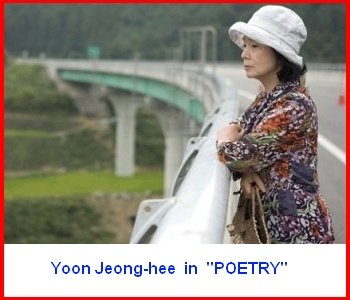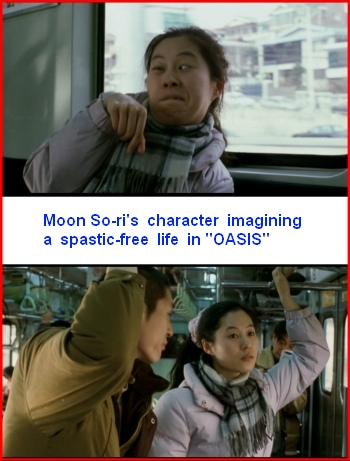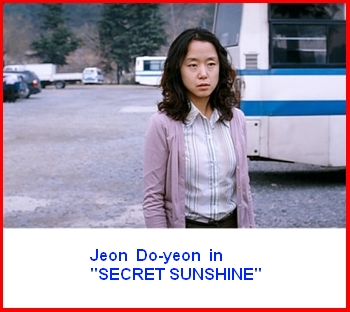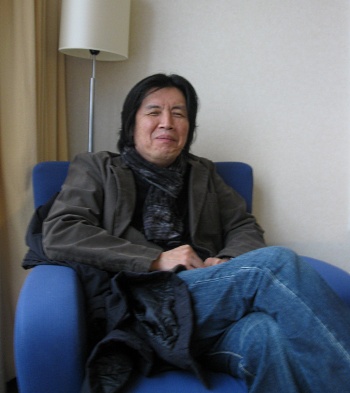IFFR 2011: An interview with LEE CHANG-DONG

The day after that screening I was allowed an interview with Mr. Lee. I do get celebrity jitters from time to time and this sure was such an occasion, for I am in awe of the man.
As a successful writer and playwright Lee Chang-dong only turned to moviemaking after friends kept insisting he should try it, but he fast became one of the most lauded directors in Korea and soon rose to international fame. Because of his reputation and respect in the Korean arts industry he was even made the Korean State Minister of Culture for a few years!
Just look at the films he directed in the last decade and how many prizes they have won at festivals worldwide. And while you're at it, check how many awards his actors have won by being in these movies.
This week, Criterion will release their first Korean title ever and surprise surprise, it is a film by Lee Chang-dong. Now we certainly can argue whether Criterion should have chosen "Secret Sunshine" or not (I can think of several other Korean titles even when limiting myself to just Lee Chang-dong) but to be honest I'm just happy we are finally getting Korean Criterions. And even though I didn't know "Secret Sunshine" was getting the C-treatment it did feature rather heavily into the conversation, due to the controversial subject matter and of course Jeon Do-yeon's powerhouse (and again, award-winning) performance.
Read on...
AV: Thank you for granting me this interview. And I want to congratulate you with your movie "Poetry" because I thought it was really beautiful.
Lee Chang-dong: Thank you.
AV: I heard that Yoon Jeong-hee, the lead actress, was in retirement. Did you write this role with her specifically in mind, or did you choose her later from a list of actresses?
 Lee Chang-dong: It is probably the same in other countries, but in Korea there aren't many actresses in their sixties who are able to carry the lead role like this, so there weren't many people I could choose from. But even when I was thinking about the story and thinking about the film she already came to mind very naturally, so I kept thinking about her as the lead character.
Lee Chang-dong: It is probably the same in other countries, but in Korea there aren't many actresses in their sixties who are able to carry the lead role like this, so there weren't many people I could choose from. But even when I was thinking about the story and thinking about the film she already came to mind very naturally, so I kept thinking about her as the lead character.
I had only met her once or twice, at festivals and some venues like that, but I felt that her "inside", her character I might say, was very similar to the lead character in "Poetry".
AV: In many of your movies the narrative is carried by a lead actor or lead actress who then gets nominated and wins awards for that role. You obviously manage to get extraordinary performances out of your actors. Do you have a general way to work with actors, or do you use a different approach when you work with, for example, Yoon Jeong-hee or Moon So-ri (in "Oasis") or Jeon Do-yeon (in "Secret Sunshine")? Because all of these actresses won awards!
Lee Chang-dong: I receive many questions like this: "How do you direct your actors / actresses?". And I'm known as a difficult director for actors. Even abroad, I keep hearing that actors say I'm hard to work with. As I said in the Q&A yesterday as well, I don't have a particular method of directing. I'm not telling them to act or be in a certain way, I'm just trying to tell them to become the persona, the character in the film.
So from that point of view I don't really have a different approach for each actor. My way of directing is the same. Having said that, every situation is of course different. Every actor is different. Every... work is different. There are differences, and in the case of Moon So-ri in "Oasis", she had to play as if she had spastic paralysis. This was VERY difficult to do.
 AV: At first I thought she really was spastic. In Korea she is of course pretty famous from television but here in the West... well, I hadn't seen her before so I assumed you had chosen an actress who really was spastic. When the first scene arrives where you see her in her fantasy, imagining herself not to be disabled I was like, WHOA!
AV: At first I thought she really was spastic. In Korea she is of course pretty famous from television but here in the West... well, I hadn't seen her before so I assumed you had chosen an actress who really was spastic. When the first scene arrives where you see her in her fantasy, imagining herself not to be disabled I was like, WHOA!
Lee Chang-dong: It was not only physically very difficult for her but also psychologically, which made it also very difficult for me as a director.
In the case of Jeon Do-yeon in "Secret Sunshine", she actually hated me during the shooting of the film. I mean she loves me now, after the shooting and the release of the film, but during the shooting she HATED me. Her character in the film hates God so I told her: "Imagine Him to be me, imagine your hate for ME.". Her hate for me was very useful for the film, for her acting.
AV: She looks livid, in the last half hour of the film she is positively seething with rage.
Lee Chang-dong: If you remember that scene just after she visits the prison... her hate for God? The way she silently looks in the camera from a distance? She wasn't acting at that moment. She was just looking at me.
AV: Ouch... that is actually pretty scary.
Lee Chang-dong (smiling): Jeon Do-yeon HATED me! She hated the director. We're fine now though.
Concerning Yoon Jeong-hee in "Poetry", we had a very good relationship. It always felt like I was just talking to a sweet lady. Her character is very similar to the character of the protagonist, and it was almost like I was dealing with a child who had aged. She is sweet and very rapt, bright. In reality during the shoot she'd even be looking at flowers and go "Oooh!.." just like the character she was playing. This made her acting very easy. Her and me, we had a sweet relationship.
 Usually actors who I have worked with speak very badly about me, but they do it in a certain way that they seem proud of it. They are even competing with each other about how bad I was! (we all laugh)
Usually actors who I have worked with speak very badly about me, but they do it in a certain way that they seem proud of it. They are even competing with each other about how bad I was! (we all laugh)
I imagine that if someone really hates me or any director after a movieshoot has finished, they'd keep quiet about it. But with me they say it as if it is a badge of honor.
AV: "Look! I survived working with Lee Chang-dong!"
Lee Chang-dong: Exactly.
AV: But if the actors hate you during the shoot, doesn't that create a lot of tension on the set? I mean, obviously it worked for Jeon Do-yeon in that context, but in general doesn't that spoil the atmosphere? And do you yourself take energy from such tension or would you rather wish it wasn't there?
Lee Chang-dong: Not only do I take energy from such tension, but also get creativity from it. And for me, I will use any method I can to evoke this. I do not try to be very specific in how I direct my actors, for instance I will not say things like "Use this expression" or "Speak this way", or "Can you please raise the pitch of your voice a bit higher" or anything like that. What I try to have them do is become the character, to feel like the character. So that's why I use any method to raise tension, so they will feel like they are the character. Sometimes, actors expect from me a bit more detail, to give them specific advise but I don't do that. But what I DO sometimes do is to tell them different stories, or speak about other things that do not seem to have anything in common with what the actors should be playing, but indirectly might help them feel the same way as the character feels so that they become the character.
AV: If that is the approach you use for coaching your actors, what does a Lee Chang-dong script look like? How much is already on paper in advance when you develop the story? Because it sounds like you give the actors a lot of room for improvisation by having them be their characters.
Lee Chang-dong: For the most part almost everything is decided in the script-phase, so everything is as set. But while I am shooting a film I would like to escape the scenario, and I would like for improvisation to happen. But usually it doesn't, and usually I stick to the script. But I like it when there are natural occurrences.
At the time of "Secret Sunshine", people in Korea were wondering if the actors were ad-libbing the whole film, if nearly every scene was done through improvisation. In fact it wasn't, everything was as planned in the script. But this testifies the brilliance of the acting of for instance Song Kang-ho... you know Song Kang-ho?
AV: Yes! He's actually one of my favorite actors.
Lee Chang-dong: Which film do you know him from?
AV: The first time I consciously saw him was in Bong Joon-ho's "Memories of Murder".
Lee Chang-dong: He's great. His acting in "Secret Sunshine" is so good it looks improvised, but it isn't.
AV: You often cover social issues and if I spot a thread in your work, it's mostly that you describe a person, then something terrible happens to him or her, then you discover the coldheartedness and ruthlessness of the people surrounding this person. They will act nice but in general they'll end up doing even more terrible things to this person. And instead on showing someone take action to end this situation you focus on the feelings of the victim. It's like you want to show the public: "Look what you're doing to people like this!". I sense that strongly in "Oasis", "Secret Sunshine" and again in "Poetry". So my question is: how do you pick the subjects for your films? Will the next one for instance again be like this?
Lee Chang-dong: I don't pick my subjects intentionally. Firstly, the things I think about are not "subjects". What I want to show are just interesting stories about people, I mean I live my life and encounter things. And things I find important in my life that have come to me, those are the things I want to make movies about. Connected to that, I want to make movies about the interesting people connected to those things.
If you watch my films you can think of them as a critique on Korea, or of politics, or society, but those are things on the side, not the main things of the films. I would like to share with the audience the way I feel about problems of life and the way I think about life.
AV: On this subject I have a bit of an ehm... risky question.
Lee Chang-dong: Hmm?
AV: In preparation for this interview I told several friends that I was going to talk with Lee Chang-dong, and would they have a question they'd like me to ask him, etcetera. This got me some good background information but then one of my friends, a Malaysian journalist who had seen "Secret Sunshine", said the following: "I will never watch another Lee Chang-dong movie. He is a hate-filled individual who hates people and especially hates Christians". So my question is: how would you react to someone who tells you that? I do see Christianity getting mentioned in all your movies. And not always automatically as a bad factor, but you do seem to want to show it each time.
Lee Chang-dong (smiling): Is your Malaysian friend a Christian?
AV: Yes, he's a Catholic.
Lee Chang-dong: I think he only sees one side of the story. In Korea, about 1.7 million people saw "Secret Sunshine" and more than half of them were Christians. Many priests told their congregation to go watch this movie, and many discussed it in their sermons. One priest even wrote a book about "Secret Sunshine". Many Christians do not consider the film to be anti-Christian. Me, I believe it is not about Christianity but about human beings, and most Christians in Korea do not think this is an anti-Christian movie.
AV: Even though the film is critical about religion as a solution to your problems, many of the Christians in the film are shown as good people who are really just trying to help the main character.
Lee Chang-dong: Especially the church people.
AV: Yes, it would have been very easy to spice up the story with a corrupt priest but that is not what happens in "Secret Sunshine".
Lee Chang-dong: One thing though: Christian church communities in Korea are often based on American evangelists and are quite fundamental. So you do get that certain attitude, that way of thinking. I don't like any fundamentalism, Christian or otherwise.
AV: Another recurring thing I spotted in your films is how people deal with crime. Instead of going to the police, you see familes contacting each other and try to reach a financial settlement. I saw that for instance in "Oasis" and indeed again, strongly, yesterday in "Poetry". Is that a common practice in Korea? I mean over here in The Netherlands we'd do the same if you accidentally hit your neighbor's car or something, but in your films they even try to settle a rape in this way. It shocked me. Is that considered normal behavior?
Lee Chang-dong: The police are often depicted in films as being powerless. This is not especially what I wanted to show in my films, but... well, take "Oasis". What I wanted to focus on in that scene is that there was such a big problem with communication, not just with the police but also amongst themselves, between the parents and the families. Nobody even thinks that the main protagonists handled voluntarily out of love, everyone just assumes it's a rape without even communicating, they all just use "common sense". In Korean, "common sense" is called "Sang-shik", and in the film that is also the name of the girl's older brother. That was a deliberate hint: if you only use common sense, you might be unable to fathom that a paralyzed spastic girl would have had sex out of love.
But with the scenes in "Poetry" I wanted to show that people normally try to cover it all up, saying that exposing a crime like this would not be beneficial to anybody. Sometimes they'd even discuss covering-up a rape in front of the girl who it happened to.
So it's not so much a financial settlement as an attempt to cover things up, to hide it from the rest of the world out of shame.
AV: Thank you very much for your time.
 And alas, that was all we had time for as Mister Lee was on a tight schedule, and was meeting people from the press left-and-right.
And alas, that was all we had time for as Mister Lee was on a tight schedule, and was meeting people from the press left-and-right.
And I'd like to especially thank Jon Pais for helping me with preparing my questions (and no, he's not the Christian friend from Malaysia, in case you wonder...). I wish I had had the opportunity to cover all the grounds Jon had carefully shown me the map of.
Also: back in 2008 when "Secret Sunshine" played at PSIFF, Michael Guillen spoke with Lee Chang-dong and wrote an article here on ScreenAnarchy (link).
The aforementioned Criterion discs of "Secret Sunshine" can be ordered through our affiliate here:
Link to Criterion's BluRay release of this title.
Link to Criterion's DVD release of this title.

Do you feel this content is inappropriate or infringes upon your rights? Click here to report it, or see our DMCA policy.






